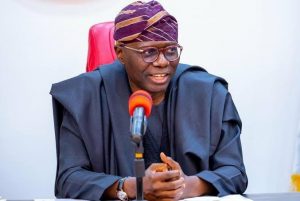Business
SANWO-OLU ORDERS CLEANUP ALONG LAGOS RED LINE CORRIDOR, AS RAIL PROJECT RACES TO COMPLETION

SANWO-OLU ORDERS CLEANUP ALONG LAGOS RED LINE CORRIDOR, AS RAIL PROJECT RACES TO COMPLETION
•Yaba Flyover opens to traffic October, says Governor during project inspection
Lagosians may have to exercise more patience, as they anticipate the completion of the 37-kilometre-long Lagos Rail Mass Transit (LRMT) Red Line project.
The construction of the rail infrastructure is at the finishing stage, but Governor Babajide Sanwo-Olu said the project will not open to the public until all stations are completely furnished and safety features put in place.
The Governor, on Wednesday, undertook a comprehensive inspection of the Red Line infrastructure, traversing the major stations of the rail project. The Deputy Governor, Dr. Obafemi Hamzat, and members of the State cabinet joined the Governor on the tour.
Beside, Sanwo-Olu inspected retrofitting work on Talgo train coaches waiting to be deployed for the Red Line operation. The trains are being equipped in Nigeria Railway Corporation (NRC) compound, Mobolaji Johnson Station, in Ebute Metta.
Construction of the Red Line project, which was conceived and started by the Sanwo-Olu administration, is being undertaken by Lagos Metropolitan Area Transport Authority (LAMATA). The rail project starts from Agbado and terminates in Oyingbo.
Sanwo-Olu kicked off the tour with the visit to Agbado at a boundary with Ogun State, where the Governor and his team took stock of the development of the rail terminal being built hundreds of metres away from the Lateef Jakande Station owned by of the NRC.
The team stopped at the Iju and Agege terminals of the Red Line, where the stations had been completed with their platforms and furniture being fitted to prepare them for operation.
At the Ikeja mega station of the rail line, turnstiles, escalators, cooling system, lighting components and other ancillary features had been installed; only work left to do was in-building demarcations and cleaning.
At Yaba Station of the Red Line, the Governor was received by an excited crowd of residents who joined him inspecting the infrastructure.
Sanwo-Olu said he was impressed by the progress of the project and the quality of construction done, assuring Lagosians that the project would be completed by the end of the year.
The Governor ordered comprehensive cleanup of the Red Line corridor ahead of the completion, directing an immediate evacuation of illegal traders and intruders along the rail tracks.
He said: “We took the opportunity of holiday to inspect the construction of the Red Line infrastructure, which is at the finishing stage. In all the stops we have made, we could see the state of the stations and their platforms. We noticed there is still some work that still needs to be done, especially around cleaning up of all illegal activities that are being conducted on the rail corridor, which should not have happened. We are also taking final approach around all pedestrian bridges to be completed along the route.
“From my observation, I can say that I am very impressed with the level of work by all contractors working on the Red Line project. I believe we are on track to finish the project by the end of this year. We will push the contractors to work tirelessly to see how they can finish on time. We will be strict on enforcement in taking out intruders from the rail corridor. We have given evacuation notice to all traders found on the corridor; we will wall off the entire corridor to make it free for passengers movement when the operation starts.
“Construction of the Red Line is on track and a lot of people cannot wait for its completion and the day they will start using it. But we cannot take safety measures for granted. Everything must be put in place before we can launch it. That is why I have taken time to come out today and push the contractors for the cleaning up, testing and completion. We want to give the best for our citizens; this is the minimum they deserve to get from my Government.”
Sanwo-Olu said since the Red Line tracks are at grid level, it would be necessary to completely wall off the corridor to ensure non-interference with the tracks and prevent accidents that may claim lives.
From next month, the Governor said there would be relief in vehicular movement on flyovers being put in place to aid rail crossings.
Some of the completed flyovers include, Ikeja Along Flyover, Yaba and Ebute Metta flyovers.
Sanwo-Olu disclosed that Yaba Bridge would open to traffic in October, while other completed flyovers along the Red Line corridor would be opened in succession from next month before the commissioning of the rail project.
He said: “Before we finally launch the Red Line, we will give vehicular relief to our citizens around rail crossings. The first bridge we will possibly open for traffic is Yaba Bridge which will happen in October. Weeks after, we will open another bridge that has been completed and do same for others.
“The Government is on track with our promise to deliver two rail infrastructure. We have delivered the Blue Line and has started operations. The second phase of the Blue Line has been awarded and the contractor has since moved to site. Its completion may happen faster than we expected.”
Business
Nigeria’s Inflation Drops to 15.10% as NBS Reports Deflationary Trend

Nigeria’s headline inflation rate declined to 15.10 per cent in January 2026, marking a significant drop from 27.61 per cent recorded in January 2025, according to the latest Consumer Price Index (CPI) report released by the National Bureau of Statistics.
The report also showed that month-on-month inflation recorded a deflationary trend of –2.88 per cent, representing a 3.42 percentage-point decrease compared to December 2025. Analysts say the development signals easing price pressures across key sectors of the economy.
Food inflation stood at 8.89 per cent year-on-year, down from 29.63 per cent in January 2025. On a month-on-month basis, food prices declined by 6.02 per cent, reflecting lower costs in several staple commodities.
The data suggests a sustained downward trajectory in inflation over the past 12 months, pointing to improving macroeconomic stability.
The administration of President Bola Ahmed Tinubu has consistently attributed recent economic adjustments to ongoing fiscal and monetary reforms aimed at stabilising prices, boosting agricultural output, and strengthening domestic supply chains.
Economic analysts note that while the latest figures indicate progress, sustaining the downward trend will depend on continued policy discipline, exchange rate stability, and improvements in food production and distribution.
The January report provides one of the clearest indications yet that inflationary pressures, which surged in early 2025, may be moderating.
Bank
Alpha Morgan to Host 19th Economic Review Webinar

Alpha Morgan to Host 19th Economic Review Webinar
In an economy shaped by constant shifts, the edge often belongs to those with the right information.
On Wednesday, February 25, 2026, Alpha Morgan Bank will host the 19th edition of its Economic Review Webinar, a high-level thought leadership session designed to equip businesses, investors, and individuals with timely financial and economic insight.
The session, which will hold live on Zoom at 10:00am WAT and will feature economist Bismarck Rewane, who will examine the key signals influencing Nigeria’s economic direction in 2026, including policy trends, market movements, and global developments shaping the local landscape.
With a consistent track record of delivering clarity in uncertain times, the Alpha Morgan Economic Review continues to provide practical context for decision-making in a dynamic environment.
Registration for the 19th Alpha Morgan Economic Review is free and can be completed via https://bit.ly/registeramerseries19
It is a bi-monthly platform that is open to the public and is held virtually.
Visit www.alphamorganbank to know more.
Business
GTBank Launches Quick Airtime Loan at 2.95%

GTBank Launches Quick Airtime Loan at 2.95%
Guaranty Trust Bank Ltd (GTBank), the flagship banking franchise of GTCO Plc, Africa’s leading financial services group, today announced the launch of Quick Airtime Loan, an innovative digital solution that gives customers instant access to airtime when they run out of call credit and have limited funds in their bank accounts, ensuring customers can stay connected when it matters most.
In today’s always-on world, running out of airtime is more than a minor inconvenience. It can mean missed opportunities, disrupted plans, and lost connections, often at the very moment when funds are tight, and options are limited. Quick Airtime Loan was created to solve this problem, offering customers instant access to airtime on credit, directly from their bank. With Quick Airtime Loan, eligible GTBank customers can access from ₦100 and up to ₦10,000 by dialing *737*90#. Available across all major mobile networks in Nigeria, the service will soon expand to include data loans, further strengthening its proposition as a reliable on-demand platform.
For years, the airtime credit market has been dominated by Telcos, where charges for this service are at 15%. GTBank is now changing the narrative by offering a customer-centric, bank-led digital alternative priced at 2.95%. Built on transparency, convenience and affordability, Quick Airtime Loan has the potential to broaden access to airtime, deliver meaningful cost savings for millions of Nigerians, and redefine how financial services show up in everyday life, not just in banking moments.
Commenting on the product launch, Miriam Olusanya, Managing Director of Guaranty Trust Bank Ltd, said: “Quick Airtime Loan reflects GTBank’s continued focus on delivering digital solutions that are relevant, accessible, and built around real customer needs. The solution underscores the power of a connected financial ecosystem, combining GTBank’s digital reach and lending expertise with the capabilities of HabariPay to deliver a smooth, end-to-end experience. By leveraging unique strengths across the Group, we are able to accelerate innovation, strengthen execution, and deliver a more integrated customer experience across all our service channels.”
Importantly, Quick Airtime Loan highlights GTCO’s evolution as a fully diversified financial services group. Leveraging HabariPay’s Squad, the solution reinforces the Group’s ecosystem proposition by bringing together banking, payment technology, and digital channels to deliver intuitive, one-stop experiences for customers.
With this new product launch, Guaranty Trust Bank is extending its legacy of pioneering digital-first solutions that have redefined customer access to financial services across the industry, building on the proven strength of its widely adopted QuickCredit offering and the convenience of the Bank’s iconic *737# USSD Banking platform.
About Guaranty Trust Bank
Guaranty Trust Bank (GTBank) is the flagship banking franchise of GTCO Plc, a leading financial services group with a strong presence across Africa and the United Kingdom. The Bank is widely recognized for its leadership in digital banking, customer experience, and innovative financial solutions that deliver value to individuals, businesses, and communities.
About HabariPay
HabariPay is the payments fintech subsidiary of GTCO Plc, focused on enabling fast, secure, and accessible digital payments for individuals and businesses. By integrating payments and digital technology, HabariPay supports innovative services that make everyday financial interactions simpler and more seamless.
Enquiries:
GTCO
Group Corporate Communication
[email protected]
+234-1-2715227
www.gtcoplc.com
-

 celebrity radar - gossips6 months ago
celebrity radar - gossips6 months agoWhy Babangida’s Hilltop Home Became Nigeria’s Political “Mecca”
-

 society6 months ago
society6 months agoPower is a Loan, Not a Possession: The Sacred Duty of Planting People
-

 society5 months ago
society5 months agoReligion: Africa’s Oldest Weapon of Enslavement and the Forgotten Truth
-

 news6 months ago
news6 months agoTHE APPOINTMENT OF WASIU AYINDE BY THE FEDERAL GOVERNMENT AS AN AMBASSADOR SOUNDS EMBARRASSING










